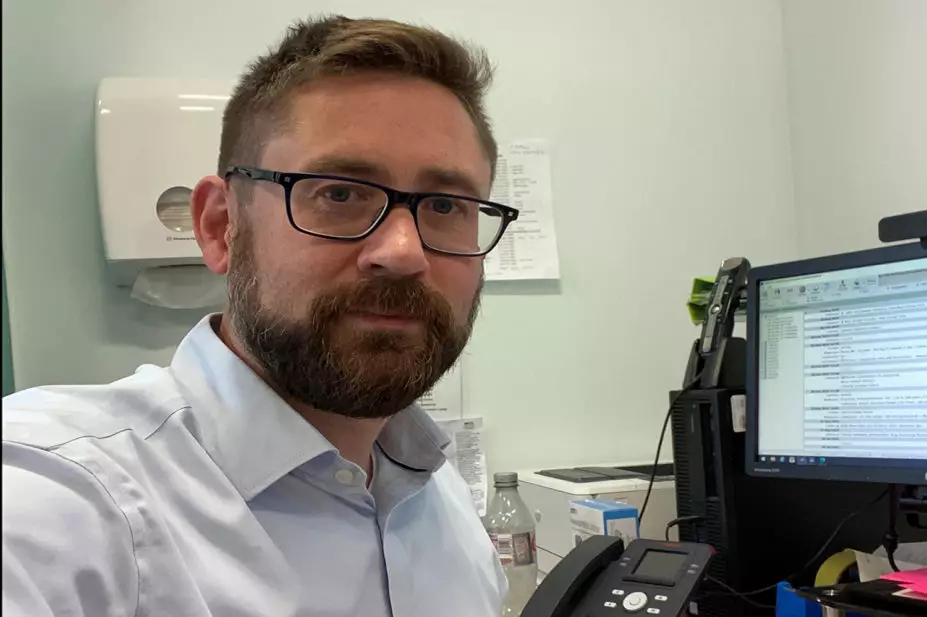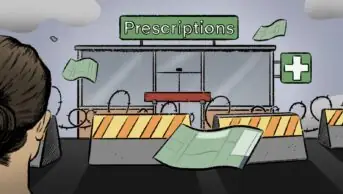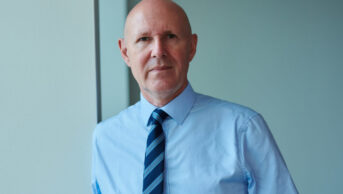
Andy Christopherson
Andy Christopherson’s role as an independent prescriber has ranged from helping people move off “benzos”, through to service management, specialising in chronic obstructive pulmonary disease and supporting the swift prescription of antivirals to vulnerable patients who develop COVID-19.
It has been a hectic seven years since he qualified as an independent prescriber, after working in primary care for ten years, but he has few regrets. “I think at that point independent prescribing was not seen as the norm [for pharmacists] in primary care but it was seen as the way the wind was blowing,” he says.
It is that added level of professionalism in front of the patient
As he was already running clinics and seeing patients, independent prescribing effectively “cut out the middleman” because he no longer had to find a GP to sign off a prescription for a patient he had seen.
“It is that added level of professionalism in front of the patient. It is definitely worthwhile, both professionally and personally. Pharmacists come into primary care to make a difference and prescribing is an important part of that toolkit,” he says.
The prescribing course he did was geared towards pharmacists, who had enormous pharmacological knowledge but less experience in clinical consultation and assessment skills. “It was very much not what I had done to date. That is the bit which really took me out of my comfort zone,” he says. “We were never trained to take a consultation or do a history.”
I would spend half of my first appointment just explaining what I was to the patients and what I could do
Christopherson’s first role after qualifying as an independent prescriber was also something that would take him out of his comfort zone: helping wean people off benzodiazepine drugs in Glasgow’s East End. Establishing relationships with users proved to be crucial as some were initially suspicious and were surprised to be given prescriptions. “I would spend half of my first appointment just explaining what I was to the patients and what I could do and why they were seeing me rather than a doctor or a nurse,” he recalls.
But the work was incredibly rewarding, he says, with patients whom he would see over months rather than weeks and who sometimes had very complex issues, including taking multiple medicines.
A move into respiratory medicine followed, along with a role in service management that took him away from the front line for a time. But the arrival of antivirals for COVID-19 earlier in 2022 meant that there was suddenly a need for pharmacists who were able to prescribe these for vulnerable patients.
Prescribing started in secondary care but it rapidly became clear there simply was not the capacity to treat all the people who needed antivirals, he says. Primary care pharmacists were asked to volunteer and Christopherson stepped forward.
“We were expecting a handful of patients a day but were getting 50, 60, 70,” he says. Prescribing Paxlovid (nirmatrelvir/ritonavir; Pfizer) was complex because of the risks of interactions with other drugs, including many likely to be taken by those who were judged vulnerable enough to receive the treatment. Decisions had to be made about which to hold or reduce while it was taken, and virtually no one had any experience of it, he says.
One of the things he did at this point was to establish peer support for prescribers and put in place arrangements for support from experts.
It has been really good for my personal growth
However, this has turned out to be one of the most rewarding experiences as a prescriber, he says. Patients are delighted to get the medicine and, for pharmacists, it has boosted their confidence in decision making, he says. “It has been really good for my personal growth,” he adds. “It makes the role more fulfilling. It makes the job easier as well as more complicated!”
Quick fire questions
- How many prescriptions do you write? “Most of my time is non-clinical but perhaps between 20 and 40 a week.”
- Do you do more prescribing or deprescribing? “What I do is optimisation — stopping and starting things at the same time. The key is appropriateness.”
- Any regrets about qualifying as an independent prescriber? “Never.”
- Favourite part of the working day? “It’s coffee time. I enjoy catching up with the practice. It is an opportunity to discuss patients but also to catch up with what is going on.”
- How do you destress? “Anything outdoors. We have a national park parks 20 minutes from us and I can see hills from the back of my house.”
- What makes your heart sink? “When patients don’t understand what they are taking and why. It shows that at some point we have not helped them as much as we could.”
- What makes your hearts sing? “A good patient interaction. I know it sounds cheesy but it is the best thing when a patient turns round and says thank you.”
Click here to return to ‘Meet the prescribers: pharmacists transforming care for patients’
2 comments
You must be logged in to post a comment.



Agreed
very motivating